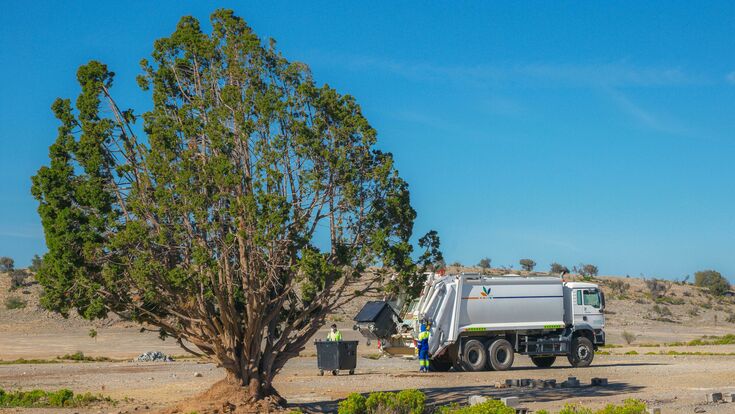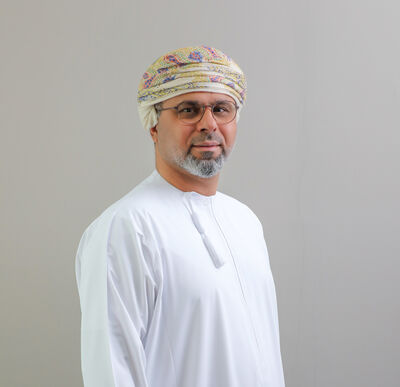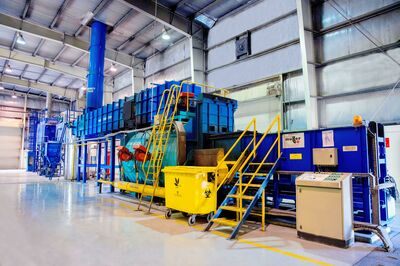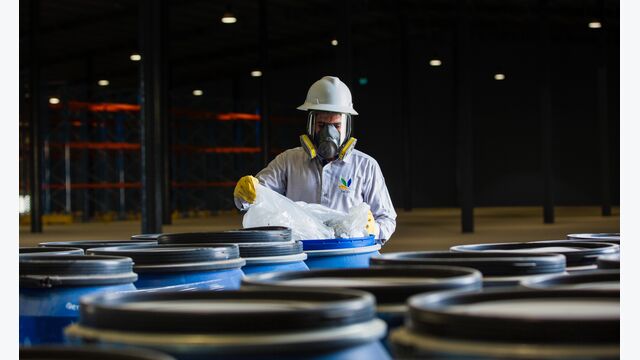Waste management industry will meet in Muscat : Oman is getting ready for the first ISWA World Congress in the Middle East

For the first time, the ISWA World Congress will take place in the Middle East. From October 30th to November 1st Oman will host the most important event for the international waste management industry. Waste Management World talked with Tariq Ali Al-Amri, CEO of the Oman Environmental Services Holding Company - be'ah, about the upcoming event, the challenges of waste management in the region, and the achievements so far as well as future projects.
What does it mean to host the first ISWA World Congress in the Middle East?
Oman's selection as the host country for the International Solid Waste Association (ISWA) World Congress is a significant recognition of its leadership and expertise in waste management. This accolade positions Oman as a hub for knowledge exchange and innovation. It is a momentous achievement for Oman, as it establishes the nation as a trailblazer in sustainable waste management practices within the Middle East and Africa. By leveraging this opportunity, Oman will showcase its commitment to environmental preservation, position itself as a regional leader, foster knowledge exchange, and stimulate economic growth. As the world looks to address pressing waste management challenges, Oman's efforts in hosting this congress serve as an inspiration and catalyst for positive change on a global scale.
Like what you read? Subscribe to our newsletters!
The theme of the congress is “Global Action towards a Net-Zero Future”. Why is it important to think globally when it comes to waste management?
Thinking globally when it comes to waste management and achieving net zero is important for several reasons. It allows us to address environmental impacts beyond local communities, recognize the finite nature of resources, and promote a circular economy on a global scale. Additionally, global thinking encourages collaboration and knowledge sharing, ensuring equitable distribution of solutions and benefits. It helps align policies and regulations, preventing the shifting of waste and pollution between regions. By adopting a global perspective, we can work together to create a sustainable and equitable future for all.
It is essential that there is a global awareness of the importance of proper waste management as it has a great impact on how polluted an area will be. The management of waste in one area can have a great impact on another area due to its pollution spreading. Waste management is a holistic approach as it deals with various types of waste that impact the country and its people. Waste management is specifically crucial as it influences the health and well-being of the community. Health risks such as diseases, contamination of water sources, and exposure to hazardous substances can be caused due to improper waste management.

Can you tell us more about the events programme: how did you choose the topics, what are the highlights?
The theme for this congress is scoped to highlight the key role of the waste and resource sector, and the transition to a circular economy could contribute towards a net-zero future aligned with Oman's 2040 vision. A net-zero future where we can achieve climate neutrality, zero loss of biodiversity, and zero uncontrolled pollution. Effectively tackling ecological collapse and climate breakdown.
Three days of comprehensive program themed: Global action towards net zero. An expo featuring technologies and tools to aid transformation.
Technical tours and social events. The sessions of the congress will include but not be limited to the following topics:
- Theme 1: Protecting Human Health and the Quality of the Environment
- Theme 2: Mitigating Climate Change
- Theme 3: Driving Resource Efficiency and the Circular Economy
- Theme 4: New Technologies Adoption and Sector Transformation Towards a Circular Economy
- Theme 5: Promoting Good Governance & Inclusion
- Theme 6: Occupational Health and Safety in the Waste Sector
211 abstracts were submitted. More than 50 confirmed speakers for the oral presentations. More than 30 countries and 43 companies will be participating.
There will also be poster presentations.
Why should readers join the ISWA World Congress in October?
As the planet faces unprecedented challenges from climate change, biodiversity loss, chemicals and waste pollution, etc.... it is important to continue the global conversation toward a Net-Zero Future.
Therefore, attending the first ISWA world congress in the Middle East and Africa will offer a different perspective regarding waste management initiatives in the region. With the unique climate challenges facing the Middle East today, this congress will shed light on this area of research and more.
Delegates will expand their knowledge, network with industry professionals, and gain valuable insights into the latest trends and innovations in the field. The congress brings together experts, practitioners, policymakers, and researchers from around the world, providing a platform to learn from leading minds in waste management. It offers a global perspective on waste management challenges and solutions, fosters networking and collaboration, exposes attendees to cutting-edge technologies and services, and provides a forum for discussing policy developments and advocating for sustainable waste management practices. By attending the ISWA, individuals can deepen their understanding, contribute to the advancement of the field, and enhance their professional growth in the dynamic and crucial area of waste management.
Furthermore, the Middle East and Africa region are currently at the center of significant global events. Following the successful hosting of COP 27 in Egypt, the stage is now set for the highly anticipated COP 28, which is scheduled to take place from 30th November until 12th December 2023 in the United Arab Emirates.
Therefore, the ISWA World Congress 2023 will serve as a pivotal platform for delegates to convene and engage in crucial discussions aimed at addressing pressing environmental and climate-related challenges and will be a bridge to continuous dialogues at the COP 28 event.
What are the major challenges for the waste sector in the Middle East and in Oman specifically?
The waste sector in the Middle East, including Oman, faces several major challenges that hinder its progress and hinder environmental sustainability. One significant challenge is that local environmental aspirations often lag behind the urgency of global environmental challenges, despite efforts to catch up. Moreover, incomplete legislation and an immature legal environment may impede effective waste management practices and hinder the enforcement of recycling targets and penalties for improper waste disposal. Another critical obstacle is the absence of financial instruments like Extended Producer Responsibility (EPR) and the Polluter Pays Principle, which could support the transformation of the waste sector towards sustainability. Additionally, the lack of an integrated regional market structure poses challenges as the small quantities of waste generated in individual markets discourage investments in recycling infrastructure. This fragmentation makes it less economically viable to set up recycling facilities. Lastly, a low level of awareness among individuals about environmental challenges hampers the collective effort to address waste-related issues effectively. To overcome these challenges, a comprehensive approach involving government policies, private sector involvement, public education, and regional cooperation is essential. This approach should promote sustainable waste management practices, strengthen legislative frameworks, create financial incentives for responsible waste handling, and foster environmental awareness among the population. Collaboration at the regional level can also help address the issue of fragmented waste streams and promote the development of recycling infrastructure.
What is the current waste management system in Oman?
The government established be'ah to tackle the waste management deficiencies in the country, with a focus on handling both hazardous and non-hazardous waste, as well as addressing the issues associated with legacy dump sites. Oman has successfully closed over 370 legacy dump sites throughout the country in under five years, replacing them with high-standard Engineered Landfills that have comprehensive systems to treat both leachate and gas.
be'ah has created a comprehensive waste management system specifically catering to the healthcare industry in Oman. This system includes three regional waste treatment sites, supported by a logistics system, to serve all hospitals and private clinics. The healthcare waste treatment facilities at be’ah adhere to international standards recommended by the World Health Organization (WHO), ensuring safe management and disposal through advanced scientific methods and technologies like incineration and autoclaving. These healthcare waste management services are commercially available to all clients across the country.
Furthermore, be'ah is currently in the process of completing an integrated Hazardous Waste management facility that will cater to the diverse needs of different industries in the country.
As part of its commitment to the Circular Economy, be’ah is making significant efforts in minimizing waste generation from the outset and diverting waste away from landfills by facilitating opportunities for investors and SMEs in the waste management sector.
Read more on waste management in Oman: Waste Management in Oman
One significant challenge for the waste sector in the Middle East is that local environmental aspirations often lag behind the urgency of global environmental challenges, despite efforts to catch up.Tariq Ali Al-Amri, be'ah
How is waste classified and managed in Oman?
In Oman, waste is categorized into two streams: hazardous and non-hazardous. Proper waste classification and management play a crucial role, particularly with the ongoing urbanization and expansion of cities. To ensure an effective and sustainable waste management sector nationwide, be'ah has embraced best practices and international standards.
be’ah is dedicated to achieving excellence in waste management by establishing a roadmap for a streamlined and successful waste management ecosystem. Their scope of work in the Municipal Solid Waste sector encompasses various aspects, including the distribution of waste containers in different governorates, container maintenance and cleanliness within a 20-meter radius, and waste collection. Additionally, be’ah is responsible for managing and operating waste management facilities such as transfer stations, engineered landfills, construction and demolition waste sites, and waste shredders operations. Over time, be’ah has expanded its services to cover all governorates, reaching 100% of Oman's population in June 2020.
To develop the infrastructure for municipal solid waste management across Oman, be’ah constructed 11 engineered landfills, and 16 transfer stations, and is currently operating 28 construction and demolition waste sites.
Healthcare Waste (HCW), presents significant risks of infection, contamination, and injury due to its nature. It originates from healthcare facilities, including hospitals, clinics, blood banks, veterinary centers, medical research institutions, and laboratories. HCW can contain infectious agents, sharp objects, toxic materials, hazardous chemicals, and pharmaceuticals, some of which may be radioactive and genotoxic. Oman's healthcare institutions generate approximately 4,500 tons of HCW annually, with the highest quantity being produced in the Muscat Governorate. Dhofar, North Al Batinah, and South Al Sharqiyah governorates follow in generating HCW, with about 15-20% of the total being hazardous.
Industrial Waste arises from industrial processes, including activities related to oil and gas, manufacturing, and energy and water production. It can be categorized as hazardous or non-hazardous waste. Hazardous waste poses threats to human health or the environment due to its physical, chemical, or biological nature. It may stem from industrial activities, healthcare services, or even daily household practices. This type of waste includes oil, chemical substances, and hazardous compounds listed by Omani authorities. be’ah has been developing strategic solutions for collecting, treating, and disposing of industrial waste based on its hazardous or non-hazardous nature. The company adheres to international standards when implementing sustainable Industrial Waste management solutions and even offers opportunities for SMEs to transport hazardous waste.

How does Oman encourage public participation and awareness in waste management?
be’ah understands that every sustainability initiative begins with people. That includes our local communities, which is why we continue to inspire them through various activities to further educate the people of Oman about the importance of sustainability, what they can do to drive change, and how every individual contribution matters to achieve social and environmental sustainability.
We invest in community projects so that our people can benefit from social and economic development. This investment is evident through the multiple approaches taken by be’ah. We engage with the public through dedicated programs divided between academic programs for schools and college students and numerous campaigns and events for the public.
Social Outreach and Community Engagement is devoted to building capacity and raising awareness through different channels while collaborating with several stakeholders.
The IEMA Foundation Certification in Waste Management saw three sessions with 36 participants, while the Certified Advanced Sustainability (ESG) Practitioner Program in collaboration with Center for Sustainability & Excellence - Chicago (CSE) took place twice with 19 participants are examples of many programs. Such programs are at the forefront of be’ahs various capacity-building initiatives. be'ah has consistently provided these programs and received positive feedback.
The Green Schools project in cooperation with the Ministry of Education aims to educate and raise awareness among students, teachers, and the local community about environmental issues, circular economy, and sustainability.
In partnership with Sohar University, completed the Industrial Waste Data Inventory project. The project provided a list of the active industries as well as the quantity and type (Solid, Liquid, Gas, Organic, Inorganic, etc.) of industrial waste generated from various industries across Oman to support the establishment of the Integrated Industrial Waste Treatment Facility (IWTF) in Sohar industrial free zone for the management of industrial waste, excluding explosive and radioactive waste.
In addition launch of the Green Schools project in cooperation with the Ministry of Education. It aims to educate and raise awareness among students, teachers, and the local community about environmental issues, circular economy, and sustainability. It also helps prepare students to make informed decisions regarding environmental issues.
Moreover, be’ah collaborated with the World Health Organization to launch a public awareness campaign about the risks of the unsafe disposal of facemasks. Since its establishment, be'ah identified several core strategies that would achieve the Government's vision for waste management. These core strategies undergo an annual review to ensure alignment with Government directives and Oman’s current situation.
Are there any initiatives or programs promoting recycling and waste reduction in Oman?
Deployment of Reverse Vending Machines (RVMs): This initiative has proven successful in diverting more than 99,300 PET bottles from landfills in Muscat during 2022. RVMs operate based on the principle of collecting plastic as the first stage in its recycling journey. Users actively participate in the lifecycle of plastic bottles, which are transformed into different products through recycling.
- Blue Bin Project: A request for proposal (RFP) was floated for deployment of the blue bins project which aims to segregate waste at source and divert up to 5% of PET waste in Oman.
- Signed an agreement with Nakheel Oman Development Company to supply green waste to their compost facility.
- Signed a memorandum of understanding with PDO for waste electrical and electronic equipment (WEEE) which aims at ensuring the proper disposal of all WEEE that is no longer functional.
Overall, these initiatives represent crucial steps toward sustainable waste management in Oman and demonstrate the commitment to environmental preservation.
What is the role of the government in waste management in Oman?
As a subsidiary of OIA (Oman Investment Authority), be'ah assumes the crucial role of managing municipal, industrial, and healthcare waste throughout the country. It offers waste management services that encompass the entire process, from collection to disposal, serving both the private and public sectors. be'ah's responsibilities extend beyond mere waste disposal and include the efficient utilization of resources, the development of appropriate infrastructure, and the pursuit of sustainable objectives, all aimed at making a long-lasting positive impact on the nation's future.
Oman Environmental Services Holding Company (be'ah) was established in 2007 to support the implementation of a comprehensive waste management plan outlined in the National Strategy Report of 2006. The company operates under the legal framework provided by Royal Decree No. 46/2009, which designates be'ah as the entity responsible for managing the waste sector and overseeing the management and operation of waste-related activities by the sector strategy.
In addition to focusing on waste management, the government is actively establishing critical pillars for the sector, such as developing a policy regulatory framework, sector laws, and a financial model.
Are there any specific programs or incentives for businesses and industries to adopt sustainable waste management practices in Oman?
Support for SMEs through the Eco-Innovate Oman (EiO) program by be’ah:
The EiO program, initiated by be’ah, serves as a business accelerator with the primary objective of fostering the growth and skill development of Omani SMEs aspiring to incorporate sustainability into their operations, combat climate change, and achieve significant financial, environmental, and social benefits. In response to the global shift towards a green economy to address climate concerns, major international corporations are increasingly considering sustainability in their procurement decisions, while governments and other entities are following similar paths. Investors are actively seeking out innovative and sustainable SMEs to invest in. The EiO program seeks to enhance the competitiveness of Omani SMEs, empowering them to compete effectively both domestically and on the international stage. A key aspect of the program involves providing Omani SMEs with training to assess their operations and value chains through Green House Gas (GHG) accounting, a pivotal step in identifying opportunities to improve environmental sustainability.
Program Outcomes:
- The EiO program ensures that participating SMEs comprehend the significance of incorporating Environmental, Social, and Governance (ESG) principles and sustainability into their business practices.
- SMEs in the program gain a comprehensive understanding of how they can assist their clients in adopting more sustainable practices throughout their value chains.
- The program educates SMEs about greenwashing, a practice in which misleading or unsubstantiated claims about a company's environmental efforts are made, allowing SMEs to avoid such pitfalls.
- The EiO program also provides sales planning and business development training, offering valuable insights from successful Omani sales personnel operating within the local context.
In addition to focusing on waste management, the government is actively establishing critical pillars for the sector, such as developing a policy regulatory framework, sector laws, and a financial model.
What are some successful waste management projects or practices implemented in Oman?
The waste-to-energy (WTE) project is a strategic initiative that will enable be'ah to achieve its targets of diverting waste from landfills. The company is currently developing a WTE IPP (independent power producer) plant in cooperation with Oman Power and Water Procurement Company. The plant will be located in Barka LF in South Al Batinah, with operations planned to commence in 2027-2028. The plant will treat approximately 4,500 tons per day to generate 160 MWh of electricity. This electricity will be connected to the main electricity supply grid.
Other by-products from the plant such as recovered metals can be sold in the recycling market,bottom ash can also be utilized as landfill cover or as raw material input into other industrial processes.
Biogas plants will treat organic waste generated at the source via an anaerobic digestion process, diverting organic waste from landfills before it reaches them. Approximately 150-200 tons per day of various source-segregated organic waste fractions will be used as a feedstock for one biogas plant to generate electricity. In addition, biogas can also be upgraded to bio-methane for use in other industries. Digestate and high-quality organic fertilizers will also be produced for use in agriculture as soil compost or soil enhancers. Strategically, be'ah plans to support the development of multiple biogas plants across the Sultanate.
With the project still in the concept phase, be'ah is currently aligning with several entities interested in setting up a Biogas Plant at their premises as a solution to treat organic waste generated on site or from surrounding areas. The project is anticipated to be tendered out in 2022 in alignment with all project stakeholders.
be'ah aims to maintain its focus on operational excellence within hazardous waste operations management. The Sohar Industrial Waste Treatment Facility is on track to achieve full completion by 2024-2025, enabling it to efficiently manage all industrial and hazardous waste generated in Oman.
- © be'ahWhat are the plans or goals of Oman in waste management and recycling?
be'ah is committed to continuously improving its waste management services by prioritizing the optimization of its infrastructure and diverting more waste from landfills over the next five years. To achieve this, be'ah has been working on commercializing various waste streams and is in talks with the government to implement MSW service fees and assess the efficiency of existing contracts related to MSW operations.
In 2023, be’ah will focus on continuing the progress of constructing the necessary infrastructure for MSW and IW, including transfer stations and expanding landfill cells. We are determined to provide high-quality services that meet international standards for productivity and efficiency.
be'ah is committed to leading the change in the waste management sector toward a sustainable future.
be'ah aims to maintain its focus on operational excellence within hazardous waste operations management, particularly in Sohar, Duqm, and Dhofar operations. The Sohar Industrial Waste Treatment Facility is on track to achieve full completion by 2024-2025, enabling it to efficiently manage all industrial and hazardous waste generated in Oman. This strategic expansion will reinforce be'ah's commitment to effective waste management and environmental stewardship in the region.
At be'ah, we firmly believe in the importance of maximizing resource utilization and minimizing environmental impacts to create a foundation for economic and environmental sustainability for future generations. To achieve this, we are committed to investing in essential infrastructure and building capacity that will leave a lasting impact on our country's future. One notable initiative is the development of an AI-based platform that automates bin monitoring and inspection activities, called Detection and Classification Platform. This platform represents a significant stride towards our strategic objective of achieving excellence in waste management. We are currently exploring the development of this platform with a local partner.
Our dedication to a circular economy business model is evident in our daily operations and continuous engagement with stakeholders at all levels. Our outlook is centered on sustainable growth and development, benefitting both the environment and society as a whole. Collectively, we play a part in global efforts aimed at conserving the environment and attaining sustainability.




